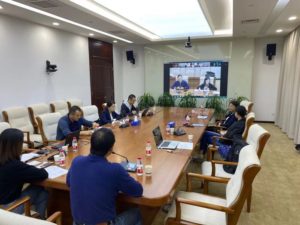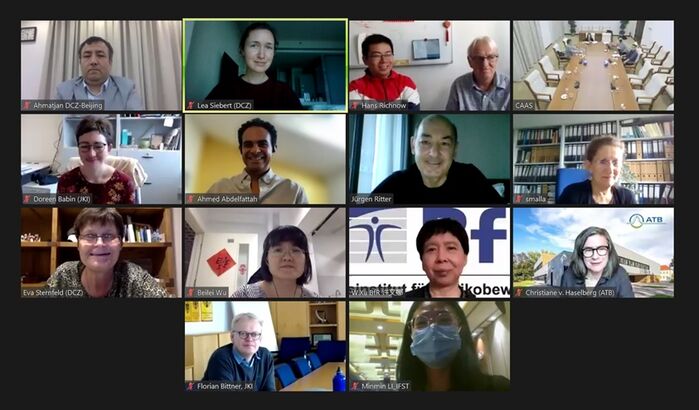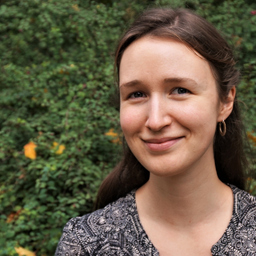On 24 September, the Chinese Academy of Agricultural Sciences (CAAS) hosted the second Exchange Forum on Sino-German collaboration in agricultural sciences. As the last Exchange Forum, several CAAS research institutions met up with potential research partners from German institutions in an online meeting, organized by the S&T Platform of the Sino-German Agricultural Centre (DCZ) and the CAAS Department for International Cooperation, Division for Bilateral Partnership.
 This time, researchers from three Beijing CAAS institutes – Institute for Food Science and Technology (IFST), Institute of Apicultural Research (IAR) and Institute of Environment and Sustainable Development in Agriculture (IEDA) – participated. On the German side, four institutes, namely the Leibniz Institute for Agricultural Engineering and Bioeconomy (ATB), Helmholtz Centre for Environmental Research (UFZ), Bee Research Institute Hohen Neuendorf (BRI), Humboldt University, and the Julius Kühn Institute (JKI) for Epidemiology and Pathogen Diagnostics, presented current research topics to their Chinese counterparts. Furthermore, the structure and potential fields of collaboration of the Federal Institute for Risk Assessment (BfR) were presented. The event was opened by Dr. Chen Tianjin from the International Department of CAAS, by Dr. Jürgen Ritter, German managing director of DCZ and Dr. Eva Sternfeld, the coordinator of the S&T Platform of the DCZ.
This time, researchers from three Beijing CAAS institutes – Institute for Food Science and Technology (IFST), Institute of Apicultural Research (IAR) and Institute of Environment and Sustainable Development in Agriculture (IEDA) – participated. On the German side, four institutes, namely the Leibniz Institute for Agricultural Engineering and Bioeconomy (ATB), Helmholtz Centre for Environmental Research (UFZ), Bee Research Institute Hohen Neuendorf (BRI), Humboldt University, and the Julius Kühn Institute (JKI) for Epidemiology and Pathogen Diagnostics, presented current research topics to their Chinese counterparts. Furthermore, the structure and potential fields of collaboration of the Federal Institute for Risk Assessment (BfR) were presented. The event was opened by Dr. Chen Tianjin from the International Department of CAAS, by Dr. Jürgen Ritter, German managing director of DCZ and Dr. Eva Sternfeld, the coordinator of the S&T Platform of the DCZ.
Chen Tianjin introduced the two main types of funding schemes available for research projects in China: competitive and non-competitive funding schemes. Competitive funding schemes are usually offered by the Chinese government, e.g. by the National Natural Science Foundation (NSFC) in open calls which are also accessible for Sino-German projects who address mutual interests of both countries. Furthermore, the NSFC is collaborating with the German Research Fund (DFG) to jointly finance projects with a focus on basic research. Non-competitive funding is provided by CAAS itself. Even though these funds are considerably smaller, they aim to support collaboration of early-stage CAAS scientists with international institutions. Currently, the funding list for next year is compiled. Furthermore, companies like Syngenta are also offering funding for seed technology projects.
The German participants shortly introduced their institutions and interest for future Sino-German research collaboration, often followed by a short presentation of Chinese CAAS researchers from a corresponding field. In the following, the topics are summarised. For more information or contacts of the researchers involved, please feel free to enquire with the DCZ: dcz-info@iakleipzig.de
Topics for potential collaboration
1) Bio-Based Packaging
On behalf of Prof. MU Taihua, SUN Hongnan from IFST introduced the institute and their current research on making use of wastewater and leaves which are discharged during the processing of potatoes and sweet potatoes. As these waste products still contain high amounts of starch and total dietary fibre, the Sino-European NaAW project conducted research on alternative high-value uses of these products. Currently, the research team focuses on bio-based food packaging coatings.
Dr. Namrata Pathak, Post-doc Researcher at the Department of Horticultural Engineering (ATB) presented current research of the “Packaging and Storage Group”. So far, they mainly focused on how to manage temperature, humidity and ethylene inside of fresh produce packaging in order to delay the process of decay.
2) Ecotoxicology
On behalf of LI Minmin, LU Jia from the IFST Food Nutrition and Functional Component Utilization Team introduced the institute’s risk assessment lab as well as current research topics around risk assessment of pesticides in the environment and in food processing.
Xiao Liu from the Department of Isotope Biochemistry (UFZ) presented his research on the uptake and metabolism of xenobiotic in plants examined by isotope and enantiomer fractionation. He found that the uptake happens through both the roots and through the leaves and that pollutants are accumulated in the rhizosphere.
Wenna XU, coordinator for international cooperation at BfR introduced the Federal Institute for Risk Assessment (BfR) which was established with its current structure in 2002, just after the mad cow disease crisis. It is an independent research institution for scientific assessment, research and communication with an annual budget of 120 million Euros. In order to avoid biases the institute can only accept additional funding from public institutions. It already has extensive collaboration with China, including a MoU with CAAS. Events like the annual BfR-Summer Academy encourage international scientists to gather – due to COVID-19 this year’s event was online and free of charge.
3) Bee Research
Prof. Kaspar Bienefeld, director of the German Bee Research Institute Hohen Neuendorf, Humboldt University Berlin presented his institute’s latest research. In the light of a global loss of genetic diversity of honeybees due to human activities, new breeding and conservation strategies for honeybees are necessary. In China, the native species A. cerana is only abundant by 25%. Climate change, rising temperatures and diseases also increase the loss of genetic diversity. Breeding with regard to specific traits, like ability to collect honey or gentleness are a good approach to respond to these processes. However, breeding honeybees is also very difficult. The BRI developed a software to model controlled mating in short- and long-term scenarios. Furthermore, they are also working on genes involved in varroa resistance.
In response to Prof. Bienefeld’s presentation two researchers from the Genetic Resources and Breeding Innovation Team of CAAS Institute of Apicultural Research (IAR) presented their current work.
CHEN Xiao, associated professor at IAR, currently researches the accurate identification of genes associated with economical traits and genome breeding in honeybees. She presented an outline and a timetable for a potential collaboration project, aiming at genome breeding in honeybees with a focus on two bee species: the Sinyuan bee species and their genes correlating to high honey production and varroa resistance and Zhejiang Royal Jelly bees.
Chao CHEN gave an overview of the situation of honeybees in China. Originally, China has no indigenous population and hence, the diversity of A. cerena is low compared to Europe. However, due to high diversity in different terrains and climates within China, a high diversity in honeybees can be expected, which is not yet fully researched. He is conducting research on A. mellifera populations in western China and identified a new subspecies: A.m.sinisxiyuan which is winter-tolerant with a lower temperature threshold and which therefore might be seriously affected by climate change. Furthermore, he found that in order to protect species diversity it is important to ensure habitat connectivity and not only the protection of certain secluded habitats. In the future, he sets a focus on conservation and utilization of genetic resources of honeybees by conservation in gene banks and through sustainable genetic breeding.
4) Crop microbiome
Prof Dr. Dongfei HAN from the Dryland Farming Group of the IEDA Crop microbiome and drought adaptability research team introduced their current work. Their research focus lies on crop microbiome and its contribution to environmental adaptation and so far they already conducted research on the impact of general cultivation and fertilization on the microbiome.
Prof. Kornelia Smalla from the JKI for Epidemiology and Pathogen Diagnostics introduced the JKI and the BONARES projects as well as their research methods (microbial community analysis, plant gene expression analysis, root exudate/rhizophere solution sampling) in order to analyse the link between soil microbiome and the plant.
Finally, Dr. Ahmed Abedelfattah from the ATB and currently also working at the Technical University of Graz, introduced his current project on microbiome management for one health. Within the working group of Prof. Gabriele Berg (also ATB and TU Graz) he is studying microbiomes potential to improve health.
There will be more Exchange Forum events! Until the end of this year, the DCZ is planning to organize an exchange with the CAAS Agricultural Genomics Institute (AGIS) in Shenzhen, the CAAS Rice Research Institute (GDAAS) in Guangzhou as well as the CAAS institutes of Shanghai and Zhejiang and the specialized Tea Research Institute (TRI) in Hangzhou. However, due to the ongoing COVID-19 pandemic, last-minute changes are possible.





